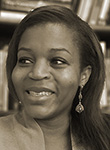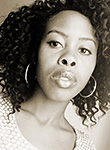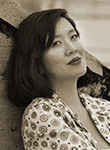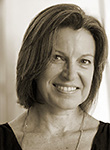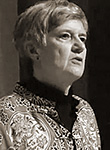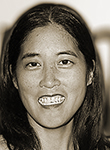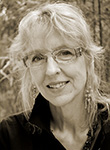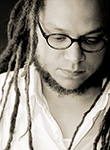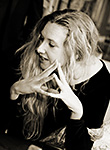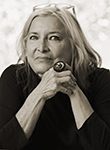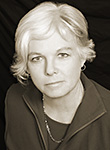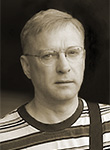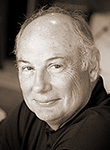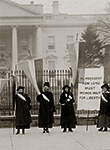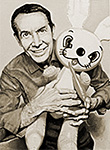Each spring, Blackbird’s Introductions Reading Loop recognizes new artists of note whose work strikes us as exceptionally fine and full of promise. Joining this company for 2018 are poets Elvira Basevich, Kwoya Fagin Maples, and Chioma Urama; fiction writers Sonal Kohli, James Leech, and Emily Nemens; and nonfiction writer Melissa Stephenson.
The three poets insist we pay attention. While Basevich asks “And who really wants all this misery?” she also reminds us that hope can be measured by degrees. Chioma Urama effervesces a stream of voices drawn from African American experiences in the South. Using space as a metaphor, she asks, “None of it makes any / sense; where is the body supposed to go?”
Kwoya Fagin Maples’s “What Yields” provides a profoundly unsettling answer to that question as she examines the history and lasting ramifications of Dr. James Marion Sims’s unethical experimentation on eleven enslaved women between 1845 and 1849. “There is no / respite to offer,” she tells us, “such exquisite wrongs do / remain.”
The stories by Kohli, Leech, and Nemens speak in distinct voices, employing the personal, dystopic, and historical to realize complex worlds in discrete spaces.
Sonal Kohli’s “10 Bela Road” is a deeply intimate portrait of a family moving out of their longtime home after the death of a patriarch—a home, the narrator insists, that “is meant to be lived in.”
James Leech’s “A Riot” presents a narrative of chaos that unfolds in the streets of London. Here, a boy’s hand reaches toward a “stranger’s stretched out throat,” if only for “the power and responsibility that come with being so near to another human.”
Emily Nemens’s “After Incus,” set in the fraught summer of 1914, follows Dr. Armin Hadžić of Sarajevo as he travels to Cincinnati to study Martha, the last living passenger pigeon. He, like his vanishing birds, falls under the shadow of the impersonal onslaught of history and the strangeness of existing in in-between spaces.
Completing the loop, Melissa Stephenson’s essays carefully intertwine American pop culture of the 1980s with the author’s childhood experiences. Stephenson underscores her speaker’s naïveté with a hint of nostalgia—a twist on the familiar desire to shun the darker discoveries of adulthood.
The First Novelist Reading Loop spotlights Jade Chang, winner of the 2017 Cabell First Novelist Award for The Wangs vs. the World (Houghton Mifflin Harcourt, 2016). The award recognizes a new writer whose debut work presents great talent and potential.
In addition to the presentation of the award, Virginia Commonwealth University’s James Branch Cabell Library also offered a reading by Chang accompanied by a panel discussion. The excerpt from the novel published here features a moment of stand-up comedy but, as Emily Block notes in her review, “Chang strikes the perfect balance of sharpness and tenderness. She takes the Wangs just seriously enough that her affection for them becomes, for the reader, contagious.”
The Claudia Emerson Reading Loop celebrates the publication of Claude before Time and Space, Emerson’s final completed collection of poems. Comprising the loop are poems from the book previously published in Blackbird, a brief interview with Emerson by Emilia Phillips (reprinted from Waxwing), an essay by Catherine MacDonald discussing her friendship with Emerson and the composition of this last book, poems by MacDonald that include an elegy for Emerson, and scattered Emerson family snapshots.
As MacDonald states, “It is the poems in Claude before Time and Space that give back to me her world then, wearying and worrying, as well as the continuing gift of her empathy, wit, imagination, and linguistic intelligence.”
In Poetry, Linda Bierds imagines Virginia Woolf’s Warboys journals with original prose poetry emulating Woolf’s diaristic entries. Doing so, she brings Woolf’s thoughts on daily life, interactions, and the “beautiful world we live in” into conversation with the solitude of her writing process, as she then admits, “I am very sorry that I cannot find anyone / to agree in this matter with me.”
Victoria Chang’s poems provocatively take the form of obituaries, lending both an intimacy and a surreal distance to the voice of the speaker as she struggles to cope with illness and its distortion of the mind and body. Chang shows us that it is this tense space the speakers of these poems occupy “until death, when comprehension and disappearance happen simultaneously.”
Cynthia Hogue’s poetry deals with tricks of vision and changing perceptions, telling us in “Crocus” that “stones rose before me. The moon cast shadows from / behind that deceived myopic night vision.”
Meanwhile, Iain Haley Pollock’s speaker transitions from the anxieties of a soon-to-be father to the draining reality of his son’s “midnight caterwauls,” “the months-long refusal to sleep” to a moment of blissful communion with his infant son as they send each other into bouts of contagious laughter.
A confrontational resolve courses through the poetry of Hala Alyan. To commemorate the new year, rather than dreaming up empty resolutions, her speaker divulges past embarrassments and infidelities only to directly address and transcend them: “I’m prettier than your wife,” she baldly states.
The poems of Michelle Boisseau (1955–2017) celebrate “another / kind of inquisition . . . to look closely, / to attend.” However, mere curiosity doesn’t suffice. The speaker is clear that the attention strangers pay to signs of her ongoing illness makes her feel uncomfortable and small, “like a stone / that’s tossed in the hand for the heft / of it.” Rather, the poems call for deeper compassion and understanding, “to see with the kind of love // that sails forth when your eyes open / to draw the other in.”
Katie Chaple expertly maneuvers between the universal and the minute, tying together images of black holes and the bones of a parakeet with a discerning eye—“the melding of voids into a larger void / in space.”
Kaveh Akbar’s translations of Negar Emrani’s poems take us to terrifying places where the strange and unspeakable come to life: “I asked the gallows to take some rest. // The gallows turned to me / and smiled.”
Janice Majewski’s poetry, through the use of long lines and anatomical language, explores the relationship between bodies and the parts within, like “how viscera has meaning only inside of the body.” The epistemological study of relationships and the self meets factoids about birds, whales, and magnetism.
Henk Rossouw moves from the personal to the communal in a dispatch from the Roggebaai district of Cape Town. At this confluence of colonial history, and through voices ranging from Zulu to Xhosa to Afrikaans, his fragmentary but sprawling verse brings the reader face-to-face with politics rooted as deeply as geography, where even “the sea’s erasure” is a “run-up / act of apartheid.”
Gail Wronsky’s poems venerate their subjects with dynamic, vivid imagery driven by winding language. She demands the subject “name with me the violet ash of our delirium and grief” and “touch with me the metal knots of my chain.”
Completing Poetry, Z.G. Tomaszewski’s “Searching This City’s Thrift Stores for Mirrors” chronicles a deep dive into heaps of discarded items “until finally a spark steps out” as the speaker searches for an identity, or at least a mirrored view of it, until a “doorbell blinks and / light becomes sound as a past self exits, or enters.”
In Fiction, Charlene Logan Burnett’s “Boardwalk ’62” limns seventeen-year-old cotton candy peddler Helene MacNamara as she struggles to juggle her own identity and the intensity of first love with the needs of her family. As one of five children, “Helene had always been the oldest, never the youngest, never the middle child.”
Kate Reed Petty, however, provides a tense and strange account of one woman’s journey to find the devil in New Orleans—sparked by a diagnosis that seems to contradict a previous bargain for a long life. The narrator of “Live Oak” suspects every man she sees because, as she’s learned, “the devil is sneaky by definition.”
In Nonfiction, Blackbird revisits Wesley Gibson’s memoir You Are Here to redirect readers to the work of a writer who tragically left us in December 2016. As Randy Marshall noted in his 2004 review: “But at least we have been warned by this hilariously disquieting romp through one man’s imagination, based on the true story of his life, that to settle for an identity is to miss the point. Identity is an answer. The self: a question.”
Memoir writing has a slippery relationship with the “real,” which preoccupies Jessie van Eerden’s “What I Want Your Voice to Do.” While the essay details a moment in her life as a writing professor trying to create a lesson on voice, her conclusions disseminate to more effect: “I want your voice to make me different than how I was. To make a memory of my death. I want mine to do the same for you. To raise the dead.”
Reviews by Chelsea Gillenwater, Kathryn Levy, Matthew Phipps, and Cassie Pruyn of new books by Mira T. Lee, Susan Hankla, Gabe Habash, and Celia Bland, respectively, round out the section.
In Gallery, Dan O’Brien’s Kandahar to Canada provides a coda to his widely respected The Body of an American. O’Brien writes, “I wrote Kandahar to Canada as a transition—a slip of a play, a dramatic elision: between Paul Watson’s work as a journalist in Afghanistan and his homecoming to Canada, between Roya Shams’s childhood in Kandahar and her adolescence at a boarding school in Ottawa, between the never-ending war ‘over there’ and our variably war-haunted lives as North Americans.” Accompanying the play are notes on its creation by O’Brien, notes on its performance from director Mark Armstrong, and images by photojournalist Paul Watson. New poems by O’Brien appear in Poetry.
Also in Gallery is Howard Risatti’s essay on Bernard Martin’s exhibit at ADA Gallery, which spotlights questions insistent in Martin’s work: “Is this a portal to the subconscious?” and “How is one to know for sure?” Martin’s work, as Risatti points out, raises “questions about what is real and what is not, and what is important and what is not.”
In our continuation of the 1917 Suite from Gallery in v16n2, we again take up chaotic events a century old, this time focusing on the movement for women’s suffrage as it is refracted through the lens of the Night of Terror at Occoquan Workhouse. Sources like Jailed For Freedom by Doris Stevens and the New York Times provide materials gathered in an effort to piece together the events of the Night of Terror into a detailed and honest assemblage of personal experience and editorialized perspectives.
In Features, we offer audio and a transcript of a panel discussion in tribute to the poet Dave Smith, moderated by Kate Daniels and presented on February 9, 2017 at the Association of Writers & Writing Programs conference. Daniels, T.R. Hummer, Mary Flinn, Molly McCully Brown, and Ernest Suarez read favorite poems by Smith and comment on how he has influenced their own lives as an “utterly uncompromising” teacher, “remarkably honest” poet, and a devoted friend.
Also in Features, VCU English and creative writing professor Gretchen Comba and Canadian poet Karen Solie read selections from their recent work as part of the VCU Visiting Writers Series. Comba reads an unpublished story, “Baby Elephant Walk,” and Solie reads a selection of poems from her most recent book, The Road In Is Not the Same Road Out (Farrar, Strauss and Giroux, 2015).
Audio from a Richmond reading of new poems by Clint McCown and David Wojahn completes the issue.
![]()
Return to top menus | Browse issue


